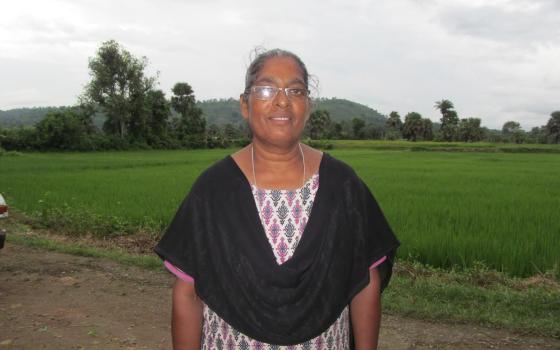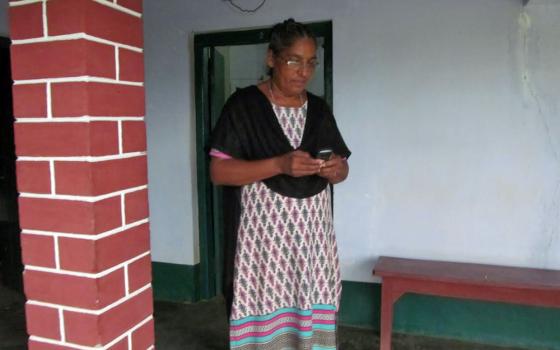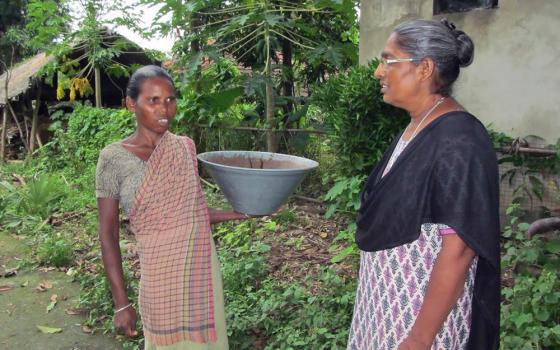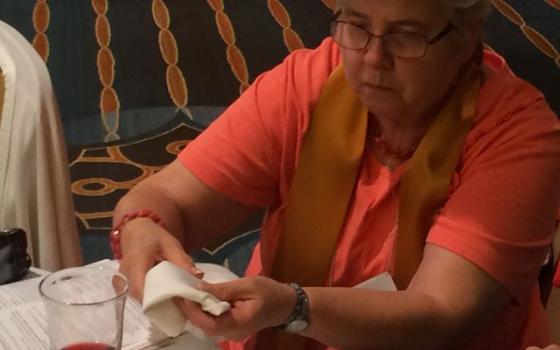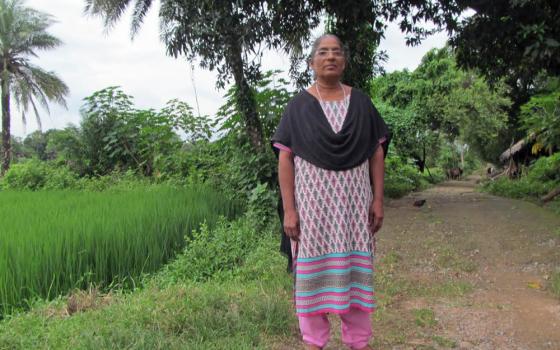Sr. Ranjana Jose entered the lives of tribal people in the eastern Indian state of Jharkhand through a new form of protest, "paddy-cutting agitation," that helped liberate villagers from centuries-old slavery under moneylenders. The Sister of Mercy of the Holy Cross also helped women weed out alcoholism, poverty, illiteracy and superstition from their villages.
It all began in 1994, when Jose joined the Jesuit-managed Tribal Welfare Centre in Kodma, a village in the Sahibganj district of Jharkhand, then Bihar. For the last 23 years, she has made Bathany Village, 12 miles away from Kodma, her home.
Jose, 64, recently shared with GSR her eventful 38 years of village life experience as a nurse, educator, social activist and reformer.
GSR: People talk so highly about your 'paddy-cutting agitation.' What is it all about?
Jose: It was a mass agitation to reclaim the agriculture lands of impoverished and illiterate tribal folks from powerful local moneylenders [locally known as Mahajan] who used to control local economy in Indian villages.
Before I get into the details of our stir, let me explain the strange situation I had found the villagers in. Most depend on agriculture and forest produce for their livelihood. As they were ignorant of modern agriculture techniques, they produced hardly enough to meet their basic requirements. Hence, they remained poor.
They had to go to moneylenders for expenses at the time of marriages, diseases and emergency situations. They got the loan by mortgaging their lands, the only asset they had, to the moneylender.
The loan sharks exploited the villagers' illiteracy and ignorance. They not only took possession of the tribal lands but made them work there as bonded laborers to repay the loan. In most cases, the villagers paid more than what they had taken either in cash or cattle, goats, chicken and grains. This was really strange.
How did you manage to end the exploitation?
As a law-abiding citizen, I unsuccessfully tried to reclaim the tribal land from moneylenders with the help of police and district administration. When I found the government machineries were no help, I began teaching the local women. I visited their houses and encouraged them to come together to protect their lands.
We also started self-help groups for women and income-generation programs to help them get rid of poverty. Women started to save 20 rupee [30 cents] each every month through the group and discontinued the practice of going to moneylenders for financial help.
Did the moneylenders let you do all these things so freely?
Obviously, there were threats, but I ignored them.
You mean you never had any fear?
You see, I came to Kodma as a trained nurse with more than 10 years of experience. One evening, two boys came to me saying people in their village, Bathany, were dying in a cholera outbreak. As there was no doctor or dispensary nearby, I rushed, carrying some medicines. I traveled with the boys, who were total strangers to me then. We traveled nearly 5 miles on a motorcycle and walked another 7.5 miles to reach [the] village around 11 p.m. Without wasting time, I visited affected families. I could finish the task only by the following night. Three people died despite my efforts. In yet another cholera outbreak, I treated more than 800 people. All this convinced me to get involved with the village life more seriously. So I made Bathany my base.
Can we get back to the paddy-cutting agitation?
I am coming to that. We unanimously decided to forcefully cut the standing crops [in the rice paddy]. We planned to let women move in front with sickles, and men followed behind them. I was in the middle, guiding them. The villagers wanted me to be safe.
As we started harvesting, the moneylenders called the police, who came and threatened us. They asked us to move out of the field. When they saw sickle-wielding women marching toward them, the police ran away, leaving their vehicles behind. The villagers outnumbered them. We cut the paddy and refused to give it to moneylenders as the villagers used to do earlier.
Didn't the police register a case against you?
Yes, the police registered cases against the villagers and me for illegally entering the field and the cutting the moneylenders' paddy. The cases, however, could not stand in the court, as the land belonged to the villagers as per the government records. The area came under a special law that did not permit nontribal people to purchase land.
What happened to your case?
My case, too, collapsed in the court, as the prosecution could not prove my identity. My name was spelled wrong in the first information report, not because they wanted to help me, but they pronounced my name wrong. Subsequently, when the case came up for hearing, the prosecution could not prove my identity, and thus, it was dismissed.
God's providence was always with me that even after taking such a dangerous step everything went on well. The situation would have been different and unimaginable if the police had resorted to firing or there was violence.
So what happened next? What was the impact of that event?
The harvest protest gave the villagers new hope and helped them get rid of their sense of helplessness. It encouraged them to work together for their betterment. Until then, the villagers were voiceless and had no courage to oppose their exploitation, although they knew they were being cheated. The protest marked a definite shift in their approach.
You have stayed in that village for 23 years without basic amenities. What motivates you?
I joined this congregation specifically to serve the poorest of the poor. Even our foreign missionary in India died of cholera in 1884 at Bettiah [a town in Bihar, Jharkhand's northern neighbor state. Jharkhand was part of Bihar until 2000.]
When I came here, there was no infrastructure. Today, we have at least road connectivity to many villages and electricity. Two months back, we got mobile connection.
When I came here, people were so poor and malnourished and suffered from seasonal diseases, illiteracy and superstitions. They depended entirely on nature for their survival. Nobody had been to a school.
At that time, my inner soul said it was the place where I had to spend my life. Soon, I took an accommodation with a family and lived like one of them without toilet or bathroom.
Within a year, I formed a committee of villagers and with their collaboration started a primary school in the village. A woman teacher was appointed to teach the children. I moved with the teacher to another house of a family with 12 members. We stayed with them for another six months. We cooked for ourselves.
Later in 1996, I got a companion sister. Three of us stayed together for five years in a one-room, thatched mud house with a corridor. Then we built a small house on a land the villagers donated in 2000.
Tell us about your bicycle experience?
Most villages in these forests are on a downhill, so I rode a bicycle to reach them faster through the forest footpaths. I used to ride at least 30 miles every day to connect with the people.
When I first went to the villages on a bicycle, they were shocked. Men, women and children lined up to watch me ride the bicycle. Women were not allowed to ride bicycles then, and they could not imagine I would come to them on a bicycle. On the one hand, the bicycle gave faster access to villages, and on the other, it was an invitation to women to come out of their traditions and find a better life.
Often, Christian missioners in Indian villages are accused of conversion. Have you faced such allegations?
Obviously, I did. People initially tried to create a rift between me and the villagers, saying I was there to convert them to Christianity. However, it did not work, as people stood with me, especially the women.
I organized more than 3,000 women through the self-help groups that helped them fight against injustice and social evils such as alcoholism among men. They saved 20 rupees a month and deposited it with their thrift society accounts. The credit unions gave them interest-free loans for their emergencies.
The women met every week and discussed their issues and sought solutions. They started to raise their voices against domestic violence. When a man fails to listen to his wife, other women come to her help. Thus, they bond as a family, sharing and caring for each other. Gradually, women were trained to speak in public, and they attended gram sabha [village council] meetings to assert their rights in personal or public life.
So yours has been a successful mission?
I don't know anything about success and failure. When I came, people lived in abject poverty and with diseases. Today, they eat enough and send their children to school. They speak for themselves without outside support. They oppose superstitions. Women now lead local civic bodies. That was unimaginable 20 years back.
[Saji Thomas is a freelance journalist based in Bhopal, a central Indian city. He has worked for several mainstream newspapers such as The Times of India.]
